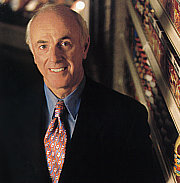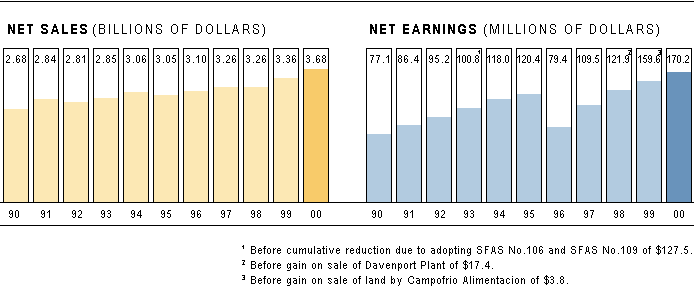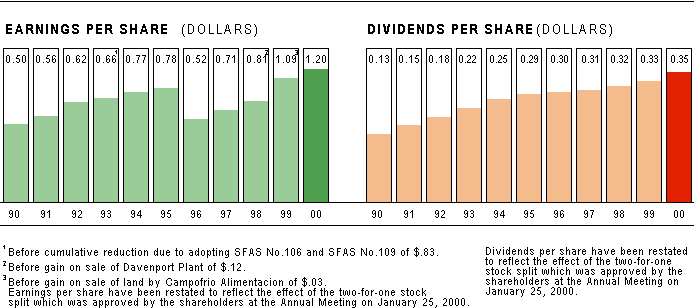|
|
 Joel W. Johnson Chairman of the Board President and Chief Executive Officer |
The quantitative results document our progress. For the fiscal
year ended October 28, the company reported total earnings of
$170,217,000, an increase of 4.1 percent, or $6,779,000, over earnings
of $163,438,000 for fiscal 1999. Reported earnings per share
were $1.20, an increase of $.09, or 8.1 percent, over last year's
figure of $1.11.
Total earnings for fiscal year 1999 included a one-time gain of
$3,808,000, or $.03 per share, from the sale of land by Campofrio
Alimentacion, S.A., Madrid, Spain, a company in which Hormel
Foods has an equity ownership interest. Excluding this gain, the
current year's earnings per share reflect a 10.1 percent increase
over the prior year.
All per share amounts have been adjusted to reflect the two-for-one
split of Hormel Foods common stock approved by shareholders on
January 25, 2000.
Dollar sales for fiscal year 2000 increased 9.5 percent to an all-time record
$3,675,132,000 versus the $3,357,757,000 achieved
last year. Total tonnage volume increased slightly from last year's
record results despite reductions in pork processing levels at
midyear and Jennie-O Foods decision to emphasize smaller
bagged whole birds.
In a review of the past year, it is now clear that the anxiety surrounding
Y2K led to a significant surge in purchases of nonperishable products. This was
especially true in our fiscal 2000 first
quarter which included the months of November and December
when hoarding reached its peak. The portfolio of the Grocery
Products Division positioned the company to benefit from this phenomenon.
Our production, sales, transportation and logistics teams
performed superbly in maximizing the opportunities Y2K provided.
Economic Value Added (EVA) Economic Value Added results improved
26 percent in fiscal 2000. The improvement was driven by maintaining
capital at fiscal 1999 levels while increasing net operating
profit after tax (NOPAT) by 10 percent.
Managers at Hormel Foods are making decisions based on the
EVA concept that all capital has a cost. Following this principle,
there is more focus on getting better returns on existing assets,
disposing of assets not returning the cost of capital and adding
new assets only if the returns are greater than the cost of capital.
All three approaches contributed to EVA growth this past year.
Marketing and R&D Support To support the many new products introduced
as well as increase market penetration for the company's
many longstanding and well-known brands, marketing expense for
fiscal 2000 was $292,808,000. This includes all media, advertising
and promotion initiatives.
Especially gratifying was the Meat Products Division's selection
as "Supplier of the Year" by Wal*Mart Stores, the highest honor
bestowed to its suppliers by one of the world's largest retailers.
The highly coveted award confirms the success of our strategic
initiatives in building partnerships with the largest retailers,
club stores and mass merchandisers in the industry. We were
chosen from more than 400 suppliers who provide fresh meat
and deli products to Wal*Mart. The criteria was based on new
product and marketing programs, sales gains from the previous
year and order fill rate.
Companywide, Hormel Foods was honored as the 2000 "New
Products Company of the Year" by PREPARED FOODS magazine.
The trade publication cited the company's innovative new products,
value-added, convenience-driven strategies and expansion
of ethnic and gourmet brands as the basis for receiving the award.
MEAT MARKETING & TECHNOLOGY magazine selected Hormel
Foods as the "Company of the Decade." Calling the company a
"Master Marketer," MM&T noted that of all the meat companies
doing business during the 1990s, none had a more consistent
record of progress and performance than Hormel Foods.
Research and development plays a critical role in the creation of
new products. R&D is also the key to improving existing products
and packaging as well as increasing the safety, efficiency and productivity
of company manufacturing operations. Total investment in
this important aspect of our business reached a record $9.6 million.
Capital Additions and Improvements Ongoing plant expansion and
modernization programs illustrate the confidence our company
has for expanded future market opportunities. The increased investment in new and
improved facilities enables us to broaden
our product lines, expand customer service and operating efficiency,
reduce costs and improve product quality. For fiscal 2000, capital
additions rose to $100,125,000, a 26.5 percent increase from the
$79,121,000 expended the year earlier.
Of major significance was the decision, announced late in the
fiscal year, to construct a 140,000 square foot distribution center
in Dayton, Ohio. The $16.8 million facility will employ 125 people
responsible for shipping 300 million pounds of product annually.
The new facility will increase distribution capacity, improve delivery
time and customer service to East Coast customers and result
in improved inventory management and reduced outside warehouse
charges. Construction is expected to be completed this
summer. In Houston, Texas, a $17.3 million expenditure resulted
in the renovation and opening of a 93,000 square foot plant for
production of cured and smoked meats, principally retail precooked
bacon products and spiral sliced Cure 81 hams.
The popularity of bacon, both center of the plate or as a topping
ingredient, led to the expansion of operations at company plants
in Austin, Minn., and Rochelle, Ill. Three lines for Black Label
bacon production were added to meet strong increased demand for
this top-of-the-line brand. New microwave cooking and high-speed
automated packaging equipment more than doubled the capacity
available for bacon bits and bacon toppings for foodservice sales.
Continued growth of the company's cooked ham business resulted in the installation in Rochelle of a new state-of-the-art continuous cooking and chilling operation which is capable of producing more than 40 million pounds of deli and foodservice products annually under the Hormel and Dubuque brands. Another investment that added 4.5 million pounds of additional capacity and improved yields was a new oven in Oklahoma City, Okla., for Fast 'N Easy hamburgers and sausage patties.
One of the company's most exciting investments is the installation
in Austin of AutoFom equipment, a technological breakthrough
in analyzing and evaluating hogs. Through the use of high-speed
computers and an array of ultrasonic transducers, thousands of
cross-sectional images are taken of hogs entering the production
process. Ultimately, AutoFom information will be used in determining
each animal's true value as well as providing genetic and
feeding data to help produce higher quality pork products for
the consumer.
Common Stock and Cash Dividends In January 2000, shareholders
approved a two-for-one split of the company's common stock,
increasing the number of authorized shares from 200 million
to 400 million. The intent of the stock split was to achieve wider
distribution of the shares and a broader market for the company's
common stock by making more shares available for trading at a
lower price per share.
We believe the stock market continues to undervalue most companies
in the food industry. As a result, we have concluded that
repurchasing our common stock is a prudent use of cash, improves
earnings per share and return on equity while also demonstrating
management's confidence in the future performance of the company.
In September 1998, the company announced plans to repurchase
up to five million shares, or 10 million split adjusted shares,
of Hormel Foods common stock. Through fiscal year close on
October 28, 2000, the company had purchased 9,042,100 shares
on the open market.
For the 34th consecutive year, the company's annual cash dividend
rate on the common stock of the corporation was raised. The new
rate of $.35 per share, up from $.33 per share, amounted to a 6.1
percent increase. Hormel Foods has an unbroken history of paying
dividends to shareholders since becoming a public company
in 1928.
Senior Management Changes I would like to recognize the important
career-long contributions made by retiring members of our management
team. Don J. Hodapp, executive vice president and chief
financial officer, retired April 30 after 34 years with the company.
In the course of his distinguished career, he held important management
positions in finance, production, information systems
and general management. Robert A. Slavik, vice president of meat
products sales, retired at calendar year-end after 33 years of dedicated
service. Thomas J. Leake, corporate secretary and senior
attorney, announced his planned retirement, effective early in
2001. He has been an integral member of the company's Law
Department for 27 years, serving as senior attorney since 1984
and corporate secretary since 1990.

We are fortunate to have great management depth and are pleased
to announce a number of promotions as a result of these retirements.
Within the administrative area, Michael J. McCoy, previously
vice president and controller, was elected senior vice
president, chief financial officer and a member of the Board of
Directors. James N. Sheehan, formerly corporate treasurer, was
named vice president and controller. Jody H. Feragen, assistant
treasurer with National Computer Systems in Eden Prairie, Minn.,
joined Hormel Foods as corporate treasurer late in the calendar
year. Roland G. Gentzler, director of finance for refrigerated foods,
was named assistant controller. James W. Cavanaugh, an assistant
secretary and senior attorney in the Law Department, was chosen
to be the company's new corporate secretary.
We further strengthened our management ranks within several
marketing and sales functions of the company, moving talented
employees into new positions of responsibility. Steven G. Binder
advanced from vice president to group vice president of foodservice.
Thomas R. Day, director of foodservice sales, and Dennis
B. Coettsch, director of foodservice marketing, were elected vice
presidents. Daniel A. Hartzog, director of business development
for meat products, was named the new vice president of meat products sales.
Near the end of fiscal 2000, Geraldine M. Joseph announced her
intention to retire from the Board of Directors at calendar year-end
after 23 years of dedicated service. Geri's insightful counsel was
valued by three generations of Board chairmen and contributed to
our growth, diversification and management team development.
In March, we were honored to have John G. Turner, vice chairman
of ING Americas, Minneapolis, Minn., join the Board of Directors.
His business and financial perspective, gained over a successful
career in the insurance industry, is welcomed in our deliberations.
Exiting fiscal 2000, we remain confident in the strategics our company
is pursuing. Our focus is on branded, value-added products
through multiple channels of distribution in domestic and international
markets. We are convinced that aggressiveness, innovation,
efficiency and financial discipline will be rewarded in the long term.

Joel W. Johnson
Chairman of the Board
President and Chief Executive Officer

|
|


